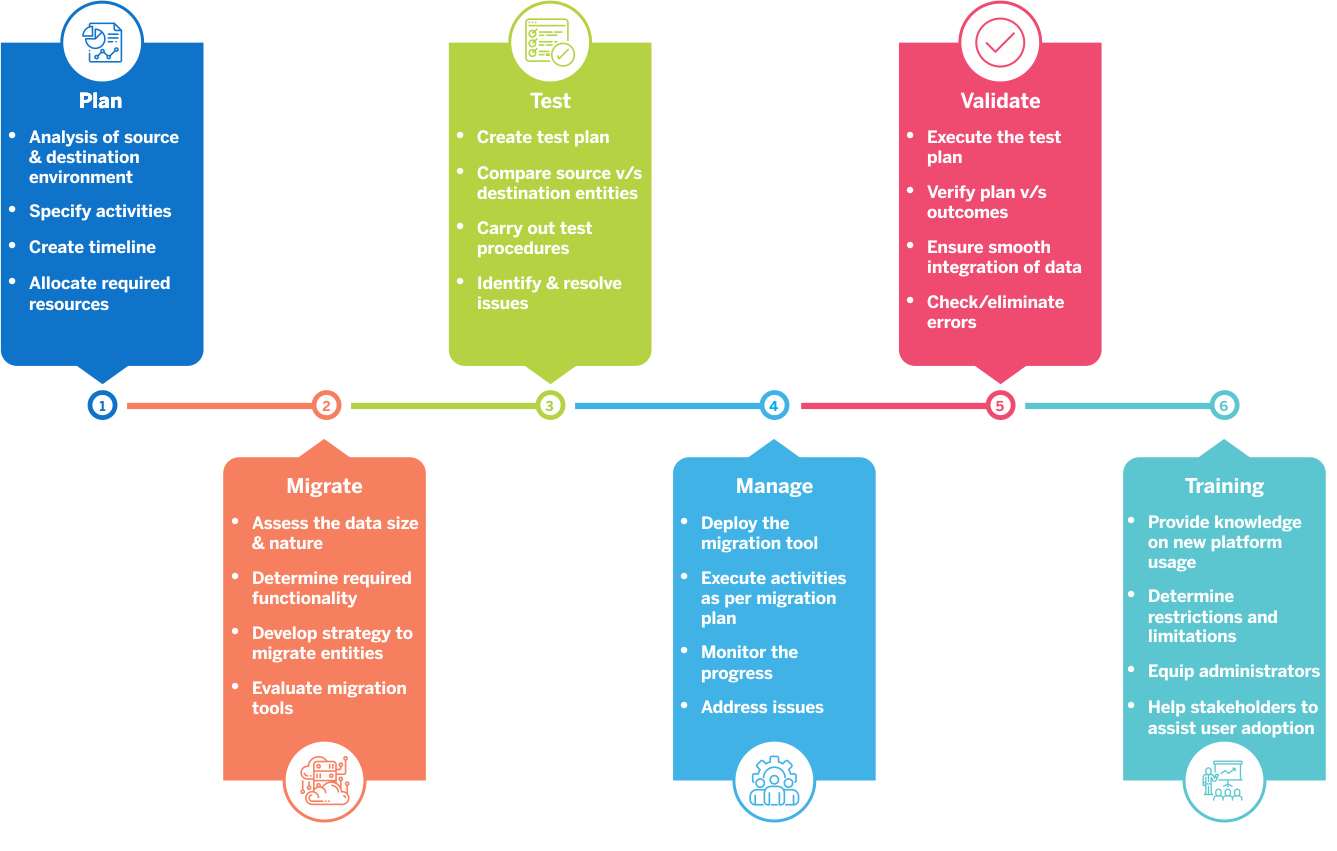Migrating to the cloud can benefit your business in multiple ways, from reducing your costs to greater data security and increased workplace productivity. However, remember that there is no uniform cloud adoption strategy. You first need to consider your business’ specific needs, goals, and problems and choose the right cloud solution accordingly.
The number of businesses migrating to the cloud is constantly growing. According to the 2019 research study by the Cloud Security Alliance, 69% of enterprises are moving business-critical information to the cloud.
Statistics also say that 81% of businesses are using multi-cloud solutions. The recent State of the Cloud report claims that companies use approximately 5 cloud environments, while some greater enterprises invest in even more complex cloud infrastructures.
For starters, let’s see how moving to the cloud can benefit your business.
1. Reasons to Migrate
There are many Benefits of Microsoft 365 Migration to your business; from improved productivity, accessibility to reduction in overall cost of IT. The advantages are clear and backed up by data that shows over 70% of the enterprises are moving their business operations to the cloud.
- Provide content access to your email, calendar, documents and collaboration content from anywhere where you have access to internet.
- Bring email together into one solution with the same features as desktop solutions
- Keep your data safe with Microsoft 365 protections, governance and compliance. Moreover, there is no loss of data as Microsoft guarantees data backup and security.
- Control schedule and budget with our approach you remain engaged in the migration process and know the effort and outcome at every step throughout migration.
2. Dealing with Migration challenges
As with any large change, migrating to Microsoft 365 can come across hurdles and complications. Your Microsoft 365 migration service provider has to be well aware of these challenges.
- Unanticipated roadblocks. A good assessment of the migration entities minimizes the interruption of a smooth and predictable process. Nonetheless, a complex source can inevitably create difficulties such as embedded links and external contents. A good schedule should anticipate such occurrences and absorb without causing a stalled process.
- Security and compliance issues. There are legitimate concerns amongst some companies for security and compliance issues. It is good to emphasize that Microsoft is one of the best platforms for security. Using Microsoft’s compliance guidelines and company policies, Microsoft 365 migration service provider must ensure that industry standards are diligently followed.
- Hybrid environments. A hybrid solution is key to some companies who want to retain some data on on-premise and migrate most data to cloud. The complications can include performance degradation, authentication failures and live synchronization of data. Your Microsoft 365 migration partner must create prototype solutions to uncover any potential hazards and resolve them accordingly.
- Custom solutions. Most large companies have some custom solutions or integration with third party tools. Some of the common approaches are: keep the existing solution and provide smooth login/authentication, modify the existing solution to fit in the new environment, develop from scratch a new solution. Attention must be paid to the complexity of the solutions before deciding on and approach.
3. Ensuring a Successful Microsoft 365 Migration
A typical migration process comprises of multiple phases, where each phase migrates a group of entities and considers the users, size, complexity and other concerns. While a Step-by-step Microsoft 365 migration process can make it smooth and easy. Below mentioned is a gradual approach that turns a monumental task into a smooth, predictable and secure process.
1. Microsoft 365 pre-migration activities
A comprehensive analysis of the source is conducted to determine content, size, software anomalies and issues, so that the work can be divided into phases appropriately. Any minor problems are fixed, redundant entities are removed and obsolete entities are archived. Another important activity is to correct user list and corresponding profiles.
2. Phased migration
Migration is performed in chunks as determined in the previous step. Each phase is completed and validated before taking the next chunk. Such methodical process ensures quality and compliance.
3. Post-migration integration
When the mainstream mailboxes, content and data is migrated to the destination Microsoft 365, focus is then diverted to integration with external tools and custom applications. Your external tools may include LOB such as CRM, ERP, BI and project management. Having better control over cross-system business processes and providing smooth and unobtrusive interface is critical, otherwise the adoption of the new system becomes increasingly difficult.
4. Training and support
To speed up the adoption by users, your Microsoft 365 Migration Service provider must provide training to IT and other key stakeholders. The training includes any new ways of operating applications, exceptions and limitations. Administrators are provided instructions on how to maintain security, performance and manage users.
Microsoft 365 Migration Services should also include providing on-going support on issues, proper usage and adoption. In addition, any required development or extension to the existing functionality should also be provided.
4. Microsoft 365 Migration – The Process
A comprehensive Microsoft 365 migration process incorporates steps to ensure completeness, quality and predictability.
- Plan – After the comprehensive analysis of the source and destination environment, a plan is developed to specify activities, timeline and required resources.
- Select migration tool – Choose the best migration tool and a strategy to migrate the entities. The migration tool will be based on the type of data, size of data and specific required functionality.
- Test – Create a test plan, so that the destination entities can be validated against the source entities. Test procedures are carried out and any identified issues are resolved.
- Manage – Execute the migration plan using the selected migration tool. Monitor the progress for any identified issues so that any interruption can be addressed.
- Validate – Execute the test plan to validate the results. Ensure that the integrity of data meets expectations.
- Training – Provide training on its usage, restrictions and limitations. Equip Stakeholders and administrators with appropriate knowledge so they can maintain and assist user adoption.

BizPortals 365 – Your Trusted Partner for Microsoft 365 Migration Services
We provide full set of Microsoft 365 migration services. Take a look at some of our most popular Microsoft 365 migration services. If you have any special need, contact us to discuss your customized migration service.
1. Exchange to Microsoft 365 migration
Our experts can help you migrate mailboxes from most exchange environments such as Exchange 2003, Small Business Server (SBS) 2008, or Exchange 2019. We can migrate on-premise data to Microsoft 365.
2. Tenant to Tenant
When the situation changes for a company due to growth or acquisition, existing tenants are merged with new or other existing tenants. Data, users and other content must be merged to upgrade an environment. Tenant data includes mailboxes, profiles, OneDrive and other complex environments such as SharePoint. A reliable 1:1 copy of the original data is migrated and merged.
3. Data migration
Data migration from other cloud sources is often required. Google Drive, Box and Dropbox are some of the example sources. The migration of documents can include files of any type with metadata.
4. SharePoint migration
SharePoint is one of the most complex environments. SharePoint migration can include content, lists, libraries and various other associated metadata. Our experts have solid experience in understanding migration details for SharePoint online and On-premise versions.
About BizPortals Solutions
Our Microsoft Gold Partner certification demonstrates our expertise, knowledge and commitment to incorporate Microsoft best practices in every Microsoft 365 deployment.
We are experienced Microsoft experts with 30+ years of combined experience. We have completed 99 projects (and counting), including highly regulated industries like Healthcare, Pharmaceuticals, Finance and Manufacturing. We’ve seen it all!
We offer licensing, design, roadmaps, ROI analysis, consulting, development, deployment, training, support and maintenance services.
Contact us to get a FREE Consultation with our Microsoft 365 experts.
Get Free Product Tour

